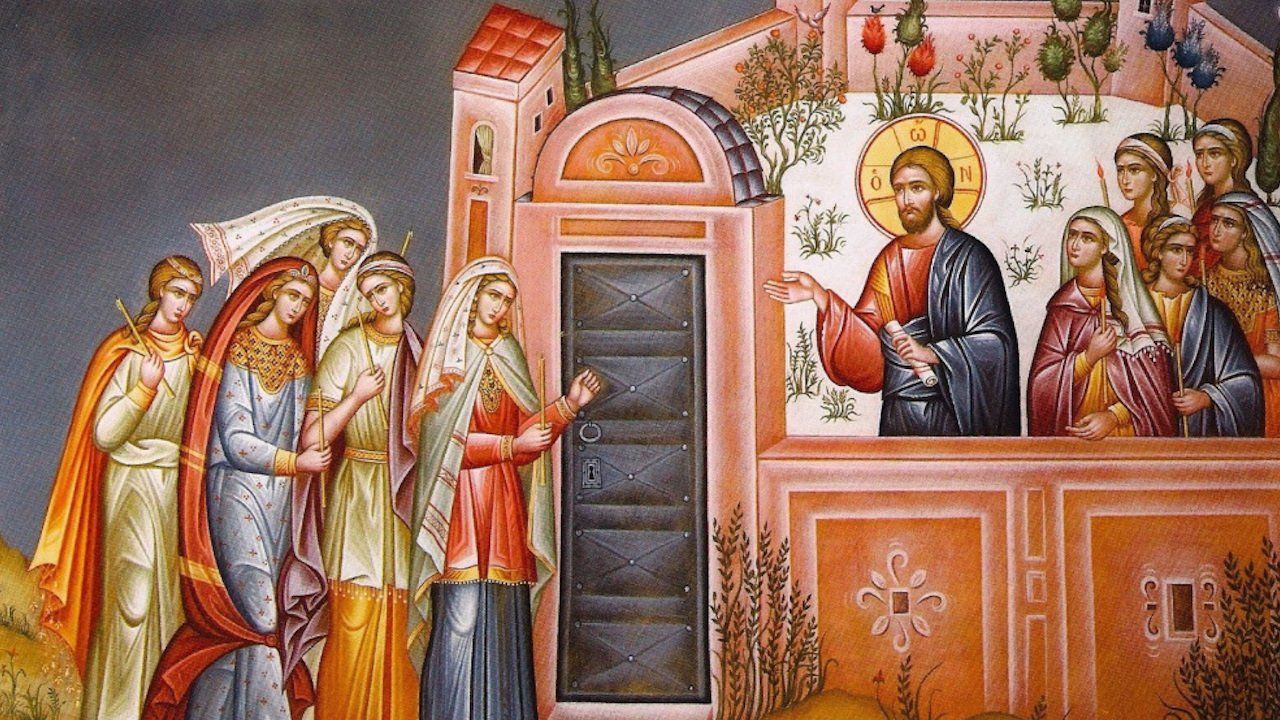The Night Is Long
by Jeri Holladay
Feast of St James the Apostle, Brother of Our Lord
Anno Domini 2015, October 23

Then the kingdom of heaven shall be compared to ten maidens who took their lamps and went to meet the bridegroom. Five of them were foolish, and five were wise. For when the foolish took their lamps, they took no oil with them; but the wise took flasks of oil with their lamps. As the bridegroom was delayed, they all slumbered and slept. But at midnight there was a cry, “Behold, the bridegroom! Come out to meet him.” Then all those maidens rose and trimmed their lamps. And the foolish said to the wise, “Give us some of your oil, for our lamps are going out.” But the wise replied, “Perhaps there will not be enough for us and for you; go rather to the dealers and buy for yourselves.” And while they went out to buy, the bridegroom came, and those who were ready went in with him to the marriage feast; and the door was shut. Afterward the other maidens came also, saying, “Lord, lord, open to us.” But he replied, “Truly, I say to you, I do not know you.” Watch, therefore, for you know neither the day nor the hour. ~Matthew 25.1-13
The Church waits for Her bridegroom, and as the years gather, many fall asleep and many grow weary, for the night is long and the way of the flesh is weak. The works of lawlessness increase and love grows cold. ~Matt. 24:12.
Still, all ten maidens, the whole Church, go out with their lamps to meet the Lord. Their virginity is a sign of their abstention from vices and of their asceticism (St. Augustine); and all have received the grace of the Holy Spirit (Epiphanius the Latin). But only half are fully prepared to meet the Lord.
What is the difference between these two groups of Christians, and why can’t they share their oil? Only half have developed the gifts they received (St. Cyril of Alexandria). St. Hilary of Poitiers tells us that the foolish were lax and unmindful, only concerned with present matters, not with hope for the Lord’s return and the general resurrection. Hence, the foolish virgins had only enough oil for the day. St. Augustine says the oil represents charity and the good works that go with it. Blessed Theophylact sees the oil as mercy and almsgiving, and Epiphanius sees it as compassion. All of these are qualities of character that bring a soul into attunement with grace.
This transformation is intrinsic to the person and cannot be divided up or shared with anyone else. The Lord returns in the middle of the night, when we least expect him (Blessed Theophylact), when we are sleepy and most vulnerable (St. Augustine). At that time, each one of us will stand before the Lord as we are, and it will be too late to fulfill our particular calling.
But all ten have fallen asleep. Does this mean all fall away in the end? Not necessarily. Many Fathers believe this is the sleep of death. The prepared and the unprepared die in their time to await the trumpet of the Lord calling them forth from their graves. Hilary of Poitiers explains it beautifully:
The sleep of those waiting is the peaceful rest of believers. . . The cry comes at midnight when no one yet knows what is happening. The sound of the trumpet of God heralds His coming, rousing all to go out and meet the bridegroom. The taking up of lamps is the return of souls into their bodies. And the light shining from them is the consciousness of good work, which is contained in their bodies, which are like flasks.
Perhaps, too, the parable refers to the long night that began when the world chose to crucify “the perfect expression of life as God intended it,” a world that has itself died (Fr. Alexander Schmemann). As we go down to sleep each night, a daily symbolic death, our souls yearn for God and our spirits keep vigil for Him even as we sleep (Is. 26:9). Dead or alive, we search for Him as the watchman waits for the dawn (Ps. 130), and we work faithfully in this world’s long night to carry out His will in our lives. Ultimately, St. Paul assures us that both those who have fallen asleep (died) in the Lord and those still alive, will be caught up to the Lord when He returns (1 Thess. 4:13-18). Either way, we are called to be ready to meet the Bridegroom with a christened soul, at a moment’s notice.
Jeri Holladay writes from Wichita, Kansas where she has been Associate Professor of Theology, Chairman of the Theology Department, founding Director of the Bishop Eugene Gerber Institute of Catholic Studies at Newman University and Director of Adult Education at the Spiritual Life Center of the Diocese of Wichita. She has also served on Eighth Day Institute’s Board of Directors and was the 2022 recipient of the St. John of Damascus Award.
Contribute to Cultural Renewal by Sharing on Your Preferred Platform
In an isolating secularized culture where the Church's voice is muffled through her many divisions, Christians need all the help they can get to strengthen their faith in God and love toward their neighbor. Eighth Day Institute offers hope to all Christians through our adherence to the Nicene faith, our ecumenical dialogues of love and truth, and our many events and publications to strengthen faith, grow in wisdom, and foster Christian friendships of love. Will you join us in our efforts to renew soul & city? Donate today and join the community of Eighth Day Members who are working together to renew culture through faith & learning.









